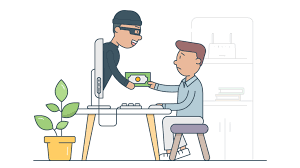Introduction
Forex Trading Frauds, Forex trading, the exchange of currencies on a global scale, has attracted millions of traders due to its potential for high returns. The allure of trading in the world’s largest financial market has also given rise to a darker side: forex trading frauds. Scammers exploit unsuspecting individuals, often leading to financial ruin. In this article, we will explore the different types of forex trading frauds, how they operate, and ways to protect oneself from becoming a victim.
Common Types of Forex Trading Frauds
- Ponzi Schemes One of the most notorious scams in forex trading is the Ponzi scheme. In such a scam, an individual or company promises high, consistent returns from forex trading. However, instead of actually trading, the returns to early investors come from the funds of new investors. When the influx of new capital stops, the scheme collapses, leaving most participants with significant losses.
- Signal Seller Scams Signal sellers claim to provide insider tips or strategies that guarantee profits in forex trading. They typically charge a fee for access to these signals, which are often unreliable or completely fabricated. Traders who follow these signals may end up making poor trades, losing their investment.
- Fake Forex Brokers Not all brokers are legitimate. Some set up fake websites or use fraudulent practices to lure traders in with the promise of great trading conditions. Once a trader deposits funds, the broker may refuse withdrawal requests, manipulate trading platforms, or even disappear entirely, leaving traders without recourse.
- Robot Scams Automated trading systems, or “forex robots,” promise to make trades on your behalf using sophisticated algorithms. While some genuine robots do exist, many are fraudulent. These robots may be rigged to lose money or are ineffective, leading traders to believe they are investing in a cutting-edge tool, only to see their funds disappear.
- Pyramid Schemes Similar to Ponzi schemes, pyramid schemes rely on recruiting new members to bring in capital. In the forex market, these schemes often disguise themselves as trading groups or investment clubs. New recruits are promised high returns from forex trades, but the real profit for the organizers comes from membership fees paid by new recruits, rather than actual trading.
How Forex Trading Frauds Operate
Scammers in the forex industry rely on psychological manipulation and the promise of easy, fast money. Here are some tactics commonly used by forex trading fraudsters:
- High-Pressure Sales Tactics: Scammers may use aggressive marketing techniques, including phone calls, emails, or social media messages, urging victims to act quickly before an “opportunity” disappears.
- Fake Credentials: Fraudsters often create fake credentials, such as fabricated licenses or partnerships with reputable institutions, to build trust with potential investors.
- Complex Jargon: They may use complicated financial jargon to confuse and intimidate victims, making it difficult for them to understand the risks involved.
- Unrealistic Promises: Fraudsters promise sky-high returns with little to no risk, capitalizing on the greed or desperation of victims. Genuine forex trading involves considerable risk, and no one can guarantee returns.
How to Avoid Forex Trading Frauds
- Research Brokers and Platforms Before investing, always verify the legitimacy of the broker or platform you plan to use. Check for licenses and regulatory approval from authorities like the Financial Conduct Authority (FCA), Commodity Futures Trading Commission (CFTC), or other reputable bodies.
- Be Skeptical of Unrealistic Promises If an opportunity sounds too good to be true, it likely is. Be wary of anyone guaranteeing profits or offering “surefire” strategies.
- Avoid Pressure Tactics Legitimate brokers and financial advisors will not pressure you into making hasty decisions. Take your time to research and consider your options before committing to any investment.
- Educate Yourself The more you understand forex trading, the less likely you are to fall victim to scams. Study the basics of trading, the risks involved, and how the market operates. This will empower you to spot fraudulent practices.
- Check Reviews and Testimonials Look for reviews from trusted sources. Be cautious of overly positive reviews or testimonials on the scammer’s website, as these may be fabricated.
Conclusion
Forex trading offers the potential for significant profit, but it also comes with risks, especially the risk of falling victim to scams. By recognizing the warning signs of forex trading frauds and taking proactive steps to protect yourself, you can navigate the forex market more safely. Always remember that genuine trading success requires time, effort, and a solid understanding of the market—there are no shortcuts.
Forewarned is forearmed: Stay informed and cautious, and avoid falling prey to the growing menace of forex trading frauds.
You Might Also Like These:
Digimon Story: Cyber Sleuth Bug Recovery
Mimecast: 365 Days of Data Recovery and Cyber Resilience
Multi Recovery DX in Cyber Sleuth: Reviving Your Digital Experience
Cyber-State Recovery: Navigating the Path to Digital Resilience
Sample Cyber Security Disaster Recovery Plan: A Blueprint for Resilience

